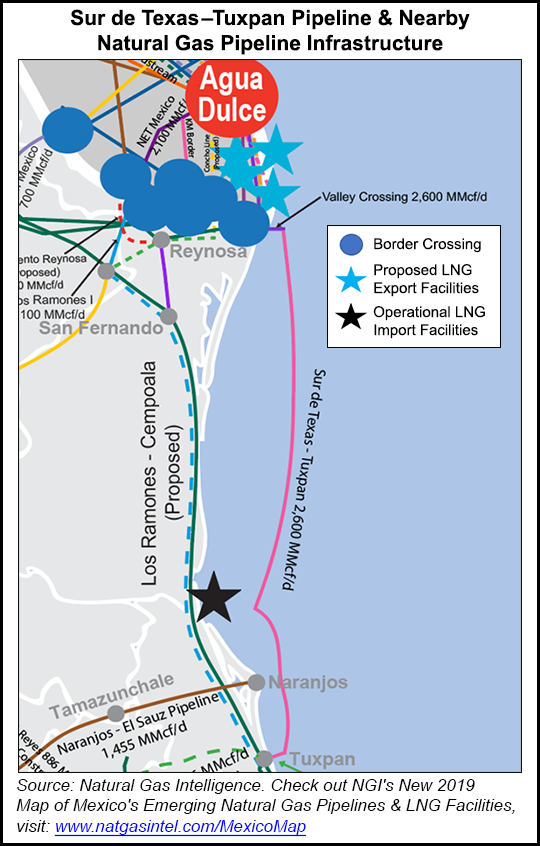Infrastructure | NGI All News Access | NGI The Weekly Gas Market Report
Mexico Natural Gas Pipeline Conflict Could be Over This Week, Says López Obrador
Mexico’s President Andrés Manuel López Obrador said during his morning press conference Monday that a resolution to the standoff between Mexican utility Comisión Federal de Electricidad (CFE) and natural gas pipeline developers could be reached later this week.

“Negotiations are ongoing with the companies that won contracts to build pipelines,” the president said. “There is a possibility that we get to an agreement this week, and we’re going to get to that agreement because the companies have agreed to dialogue, and to the revision of their contracts that we’ve considered excessive, and they’ve shown a disposition to reach a resolution so that we don’t end up in court.”
In July, the CFE filed arbitration requests with the developers of seven stalled pipelines in the country in an attempt to amend the force majeure clauses of the 25-year firm capacity agreements built into the original contracts.
Under the force majeure clauses of the seven pipelines, CFE has had to make capacity payments to the developers, despite the pipelines not being in operation. López Obrador and CFE general director Manuel Bartlett have called the contracts “abusive.”
Among the stalled pipelines is the 2.6 Bcf/d Sur de Texas-Tuxpan pipe, a crucial outlet for Texas natural gas and fundamental to reliable gas service to the southeast of Mexico. The $2.5 billion marine pipeline owned by Infraestructura Energética Nova (IEnova) and TC Energy Corp is ready to enter service but remains stalled as the pipeline spat continues.
The other developers facing arbitration are Mexican companies Fermaca and Grupo Carso.
In addition to the marine pipeline, the other six pipelines in question are Tuxpan-Tula (TC Energy), Tula-Villa de Reyes (TC Energy), Guaymas-El Oro (IEnova), Samalayuca-Sásabe (Grupo Carso), La Laguna-Aguascalientes (Fermaca), and Villa de Reyes-Aguascalientes-Guadalajara (Fermaca).
The president said Monday that a Mexican pipeline company had already “taken the first exemplary step” to renegotiate and saw other companies following suit.
“This would represent big savings for public finances,” López Obrador said, adding that “hopefully we sign on Thursday.”
In the case of the marine pipeline, CFE is seeking $899 million in compensation.
Shortly after the arbitration requests were made, a working group was established in an attempt to resolve the conflict prior to reaching the legal stage, with representatives from the government, business chambers Consejo Mexicano de Negocios (CMN) and Consejo Coordinador Empresarial (CCE), as well as officials from IEnova, TC, Fermaca and Grupo Carso at the table.
López Obrador said that the dialogue was occurring in good faith, and that if an agreement was not met this week then it would happen next week. “We’re advancing very well.”
GMEC energy consultancy’s Gonzalo Monroy told NGI’s Mexico GPI that the president’s words were “in line with the expected outcome: a negotiated way out before arbitration proceedings.”
In a similar ilk, IEnova CEO Tania Ortiz said in the company’s second quarter earnings call that she did not “see this dragging into next year” and that the Mexico government had “clearly stated that they want to reach an agreement soon.”
TC management said that the conflict could extend into 2021 if the case went to arbitration, an eventuality no party would want.
The pipeline disagreement has caused considerable consternation in the natural gas market on both sides of the U.S.-Mexico border and into Canada.
In early August, Texas Gov. Greg Abbott sent a letter to López Obrador urging a resolution.
“New pipeline projects and other projects can provide Mexico with an abundant supply of natural gas by safely transporting natural gas from oversupplied Texas to Mexican power plants and manufacturers,” Abbott wrote to López Obrador. “Mexico and Texas will both benefit if your administration can quickly conclude your review and allow the newly constructed pipelines to begin transporting clean natural gas across our shared border.”
Meanwhile the Mexican President has been adamant that the United States-Mexico-Canada Agreement (USMCA) free trade treaty will be approved by next month, which would be unlikely if the disagreement were to continue.
“We are going to maintain good relationships with the government of the United States,” López Obrador said last Thursday. “We are going to continue convincing them the best thing is cooperation for development. No tariffs or forced measures. We need to work in a coordinated fashion. President Trump understands this. Contrary to what you might think, our relationship is good.”
© 2024 Natural Gas Intelligence. All rights reserved.
ISSN © 2577-9877 | ISSN © 2577-9966 | ISSN © 1532-1266 |
